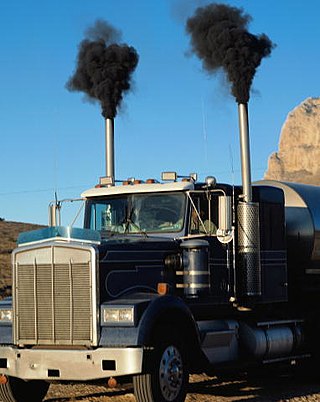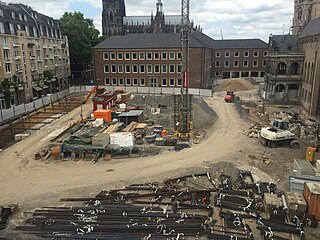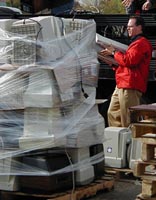Related Research Articles

In economics, an externality or external cost is an indirect cost or benefit to an uninvolved third party that arises as an effect of another party's activity. Externalities can be considered as unpriced components that are involved in either consumer or producer market transactions. Air pollution from motor vehicles is one example. The cost of air pollution to society is not paid by either the producers or users of motorized transport to the rest of society. Water pollution from mills and factories is another example. All (water) consumers are made worse off by pollution but are not compensated by the market for this damage. A positive externality is when an individual's consumption in a market increases the well-being of others, but the individual does not charge the third party for the benefit. The third party is essentially getting a free product. An example of this might be the apartment above a bakery receiving some free heat in winter. The people who live in the apartment do not compensate the bakery for this benefit.

Recycling is the process of converting waste materials into new materials and objects. This concept often includes the recovery of energy from waste materials. The recyclability of a material depends on its ability to reacquire the properties it had in its original state. It is an alternative to "conventional" waste disposal that can save material and help lower greenhouse gas emissions. It can also prevent the waste of potentially useful materials and reduce the consumption of fresh raw materials, reducing energy use, air pollution and water pollution.

Infrastructure is the set of facilities and systems that serve a country, city, or other area, and encompasses the services and facilities necessary for its economy, households and firms to function. Infrastructure is composed of public and private physical structures such as roads, railways, bridges, airports, public transit systems, tunnels, water supply, sewers, electrical grids, and telecommunications. In general, infrastructure has been defined as "the physical components of interrelated systems providing commodities and services essential to enable, sustain, or enhance societal living conditions" and maintain the surrounding environment.

Construction is a general term meaning the art and science of forming objects, systems, or organizations. It comes from the Latin word constructio and Old French construction. To 'construct' is a verb: the act of building, and the noun is construction: how something is built or the nature of its structure.

Small businesses are types of corporations, partnerships, or sole proprietorships which have a small number of employees and/or less annual revenue than a regular-sized business or corporation. Businesses are defined as "small" in terms of being able to apply for government support and qualify for preferential tax policy. The qualifications vary depending on the country and industry. Small businesses range from fifteen employees under the Australian Fair Work Act 2009, fifty employees according to the definition used by the European Union, and fewer than five hundred employees to qualify for many U.S. Small Business Administration programs. While small businesses can be classified according to other methods, such as annual revenues, shipments, sales, assets, annual gross, net revenue, net profits, the number of employees is one of the most widely used measures.

Used goods, also known as secondhand goods, are any item of personal property offered for sale not as new, including metals in any form except coins that are legal tender, but excluding books, magazines, and postage stamps. Used goods may also be handed down, especially among family or close friends, as a hand-me-down.

Electronic waste recycling, electronics recycling, or e-waste recycling is the disassembly and separation of components and raw materials of waste electronics; when referring to specific types of e-waste, the terms like computer recycling or mobile phone recycling may be used. Like other waste streams, reuse, donation, and repair are common sustainable ways to dispose of IT waste.
A social enterprise is an organization that applies commercial strategies to maximize improvements in financial, social and environmental well-being. This may include maximizing social impact alongside profits for co-owners.

Reverse logistics encompasses all operations related to the upstream movement of products and materials. It is "the process of moving goods from their typical final destination for the purpose of capturing value, or proper disposal. Remanufacturing and refurbishing activities also may be included in the definition of reverse logistics." Growing green concerns and advancement of green supply chain management concepts and practices make it all the more relevant. The number of publications on the topic of reverse logistics have increased significantly over the past two decades. The first use of the term "reverse logistics" in a publication was by James R. Stock in a White Paper titled "Reverse Logistics," published by the Council of Logistics Management in 1992. The concept was further refined in subsequent publications by Stock (1998) in another Council of Logistics Management book, titled Development and Implementation of Reverse Logistics Programs, and by Rogers and Tibben-Lembke (1999) in a book published by the Reverse Logistics Association titled Going Backwards: Reverse Logistics Trends and Practices. The reverse logistics process includes the management and the sale of surplus as well as returned equipment and machines from the hardware leasing business. Normally, logistics deal with events that bring the product towards the customer. In the case of reverse logistics, the resource goes at least one step back in the supply chain. For instance, goods move from the customer to the distributor or to the manufacturer.
A sustainable business, or a green business, is an enterprise which has a minimal negative impact or potentially a positive effect on the global or local environment, community, society, or economy—a business that attempts to meet the triple bottom line. They cluster under different groupings and the whole is sometimes referred to as "green capitalism". Often, sustainable businesses have progressive environmental and human rights policies. In general, a business is described as green if it matches the following four criteria:
- It incorporates principles of sustainability into each of its business decisions.
- It supplies environmentally friendly products or services that replace demand for nongreen products and/or services.
- It is greener than traditional competition.
- It has made an enduring commitment to environmental principles in its business operations.

In the context of physical construction, deconstruction is the selective dismantlement of building components, specifically for reuse, repurposing, recycling, and waste management. It differs from demolition where a site is cleared of its building by the most expedient means. Deconstruction has also been defined as "construction in reverse". Deconstruction requires a substantially higher degree of hands-on labor than does traditional demolition, but as such provides a viable platform for unskilled or unemployed workers to receive job skills training. The process of dismantling structures is an ancient activity that has been revived by the growing fields of sustainable and green building.
International business refers to the trade of Goods and service goods, services, technology, capital and/or knowledge across national borders and at a global or transnational scale.

Reuse is the action or practice of using an item, whether for its original purpose or to fulfill a different function. It should be distinguished from recycling, which is the breaking down of used items to make raw materials for the manufacture of new products. Reuse—by taking, but not reprocessing, previously used items—helps save time, money, energy and resources. In broader economic terms, it can make quality products available to people and organizations with limited means, while generating jobs and business activity that contribute to the economy.

A waste picker is a person who salvages reusable or recyclable materials thrown away by others to sell or for personal consumption. There are millions of waste pickers worldwide, predominantly in developing countries, but increasingly in post-industrial countries as well.

An environmental enterprise is an environmentally friendly/compatible business. Specifically, an environmental enterprise is a business that produces value in the same manner which an ecosystem does, neither producing waste nor consuming unsustainable resources. In addition, an environmental enterprise rather finds alternative ways to produce one's products instead of taking advantage of animals for the sake of human profits. To be closer to the goal of being an environmentally friendly company, some environmental enterprises invest their money to develop or improve their technologies which are also environmentally friendly. In addition, environmental enterprises usually try to reduce global warming, so some companies use materials that are environmentally friendly to build their stores. They also set in place regulations that are environmentally friendly. All these efforts of the environmental enterprises can bring positive effects both for nature and people. The concept is rooted in the well-enumerated theories of natural capital, the eco-economy and cradle to cradle design.

Equipment rental, or plant hire, is a service industry providing machinery, equipment and tools for a limited period of time to final users, mainly to construction contractors but also to industry and individual consumers. Renting can be defined as paying someone for the use of something for temporary or short-term purposes.
A sustainability organization is (1) an organized group of people that aims to advance sustainability and/or (2) those actions of organizing something sustainably. Unlike many business organizations, sustainability organizations are not limited to implementing sustainability strategies which provide them with economic and cultural benefits attained through environmental responsibility. For sustainability organizations, sustainability can also be an end in itself without further justifications.

A circular economy is a model of resource production and consumption in any economy that involves sharing, leasing, reusing, repairing, refurbishing, and recycling existing materials and products for as long as possible. The concept aims to tackle global challenges such as climate change, biodiversity loss, waste, and pollution by emphasizing the design-based implementation of the three base principles of the model. The main three principles required for the transformation to a circular economy are: designing out waste and pollution, keeping products and materials in use, and regenerating natural systems. CE is defined in contradistinction to the traditional linear economy.
RREUSE is an international nonprofit network that links social enterprises active in the environmental field of reuse, repair, and recycling. Its main focus areas are environmental protection, social equity, and economic viability.

Container-based sanitation refers to a sanitation system where toilets collect human excreta in sealable, removable containers that are transported to treatment facilities. This type of sanitation involves a commercial service which provides certain types of portable toilets, and delivers empty containers when picking up full ones. The service transports and safely disposes of or reuses collected excreta. The cost of collection of excreta is usually borne by the users. With suitable development, support and functioning partnerships, CBS can be used to provide low-income urban populations with safe collection, transport and treatment of excrement at a lower cost than installing and maintaining sewers. In most cases, CBS is based on the use of urine-diverting dry toilets.
References
- ↑ Griessler, Erich; Leitner, Andrea; Leuthold, Margit; Littig, Beate; Pladerer, Christian; Prenner, Peter and Roiser-Bezan, Gina (2001) Evaluierung der arbeitsmarktpolitischen Maßnahme Reparatur- und Service-Zentrum R.U.S.Z.: Endbericht; IHS-Studie in Kooperation mit dem Österreichischen Ökologie Institut im Auftrag des Wiener ArbeitnehmerInnen Förderfonds. https://irihs.ihs.ac.at/id/eprint/1396/
- ↑ COM(2005) 141, http://europa.eu.int/growthandjobs/pdf/COM2005_141_en.pdf